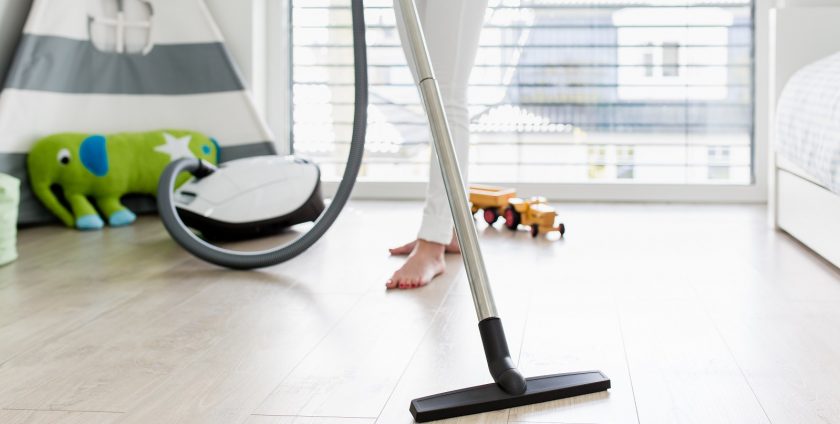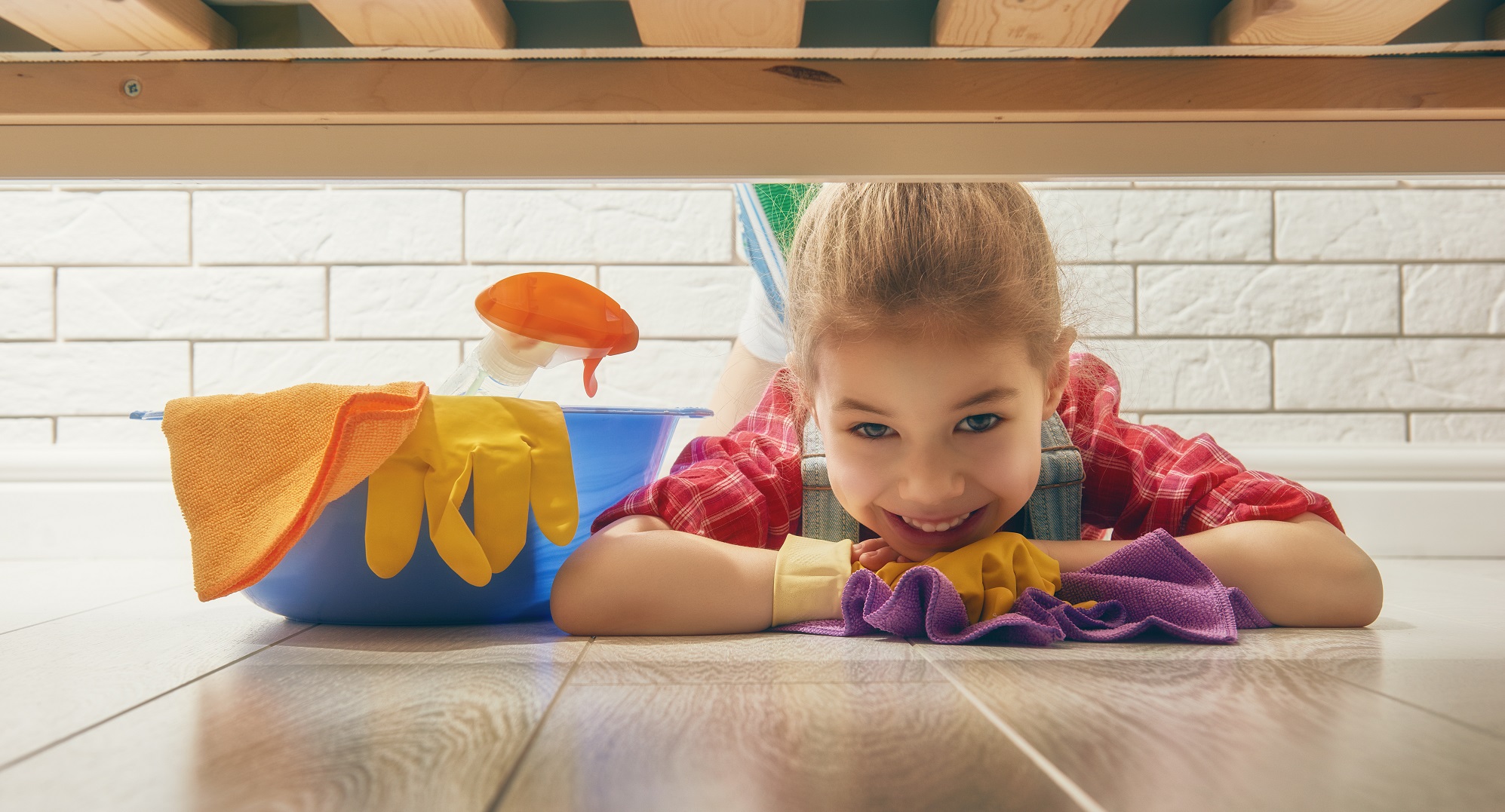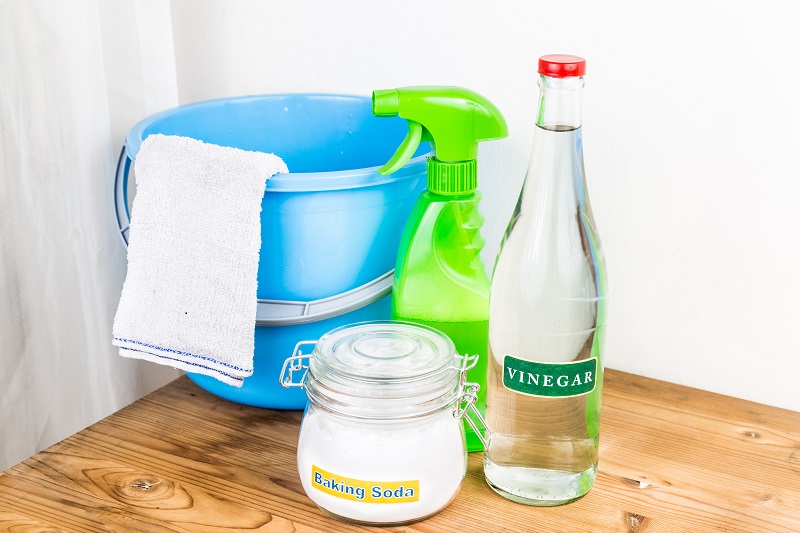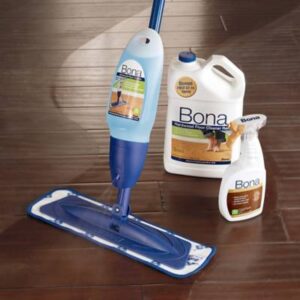How to Clean Your Hardwood Floors

- Tags: cleaning, maintenance, mopping, prefinished
- Category: Blog
- 2 responses comment
We were going to call this “How to Clean Your Hardwood Floors” but realized that it would be the shortest blog in history. That’s because there are really only a few items that should touch your prefinished hardwood flooring, but we’ll get to those later. First, we want to make sure that you are aware of what not to use to clean your hardwood floors. This is actually a more important perspective, as some of the items mentioned below can harm a floor’s finish with just one application.
Cleaning that may work for some parts of your home might not be the correct method for your hardwoods. Knowing proper hardwood care and maintenance is an important step to protecting your investment.

How NOT to Clean Hardwood Flooring
Before we start, here is a little background to help explain why some of the solutions used in the past are no longer applicable. Prefinished flooring is not the same as unfinished hardwood flooring, natural oil finished flooring, or site-finished flooring—all of which require their own cleaning instructions. Prefinished (or factory-finished) hardwood flooring is created by applying decorative stains and durable finishes that are cured with UV light. Prefinished floors were introduced to the American consumer in the early 1950’s.
Since then, finishes have kept evolving, and so have their care and maintenance instructions. Even in the last 10-15 years we’ve seen great advancements in the formula and processes that “finish” floors. This is why your Great Aunt’s oil soap or the cleaning lady’s vinegar solution not only won’t clean today’s prefinished planks, they can ruin them. It’s important to point out here that when you are cleaning you really aren’t actually cleaning the wood; you are cleaning the finish that protects the wood.
Here is a list of products that are the most common enemies of your prefinished hardwood, which unfortunately most people still use:
Vinegar 
Though definitely a great household product in other areas, the acidic nature of vinegar will eat right through the dirt on your floor and devour your finish! Even one application will dull the shine.
Ammonia
Like vinegar, ammonia is very acidic, with a pH that can not only eat away the floor’s protective finish, but can also cause discoloration.
Steam Cleaners
They work great for carpeting. But even if they indicate that they are for hard surfaces, they can warp and damage hardwood with excessive heat and moisture.
Floor Waxes and Self-Polishing Acrylic Cleaners
Even though they say they are going to put a shine on your floors, don’t believe it. Most store-bought waxes will leave a sticky film on the surface that will attract debris and pet hair, leaving a dulled finish that looks even dirtier than before and becomes almost impossible to clean.
Oil Soap
Oil soaps are designed to absorb into the material that’s being cleaned to prevent drying out. The coating on prefinished hardwoods means that the oil will remain on the surface. This would not only pose a hazard to walk on but can look milky and dull.
Water – Don’t Wet Mop
We don’t mean a quick spot clean with a damp rag, we mean a bucket of water and a wet mop sending moisture between the planks. This can cause cupping, buckling, and even cracks over time.
Furniture polish
We promise you that though a furniture polish’s label reads “good for all wood surfaces,” flooring was most likely not on the manufacturer’s mind. Make no mistake, your oily or lemon-scented furniture cleaner will not only NOT clean your floors, it will make them as slippery as ice.
All Purpose Cleaners
“All purpose” is another misleading statement. The surfaces they are designed for are not porous like wood, and the harsh chemicals they contain to combat smudges on glass can destroy your flooring’s finish.
Abrasive Sweepers
It’s not just about cleaning solutions… hard bristle broom and even vacuum cleaners with the wrong attachments can scratch flooring. A soft bristle broom is the best method to sweep up dirt and dust.
How to Properly Clean Hardwood Flooring
Well, now that we’ve given you a long list of “don’ts,”here are four “dos” LIFECORE recommends:
1. Damp mops, following instruction using any of the hardwood floor cleaners made by Bona. We are not affiliated with Bona, but we chose to mention their products because they were created specifically for prefinished hardwood flooring by flooring professionals. They are also effective, reasonably priced, and can be found in most supermarkets, home goods, and hardware stores.
2. A soft, dry mop (preferably microfiber) to apply cleaners, mop up wet spills, and defend your home against dust in the interim. Find these in most stores carrying housewares or online.
3. A soft-bristled broom to sweep up dry spills.
4. If you have a cleaning service or helpful friend who lends a hand in cleaning your hardwoods, have cleaning instructions and product available for them. This will avoid a good intention gone wrong.
So, there you have it. Barring the unforeseen, those three items should keep your prefinished hardwood floors looking spectacular for years to come!
2 Responses to “How to Clean Your Hardwood Floors”
Leave a Reply

My husband would like to redecorate our living room and install hardwood floors in it. Well, I’m glad you shared these cleaning tips; we’ll make sure to clean it with a lemon-scented furniture cleaner. Thank you for also clarifying here that a soft bristle broom must be used in cleaning the floors.
It was really helpful when you explained that it is a good idea to avoid using brooms that have hard bristles when cleaning wood floors. This summer, my wife and I are wanting to install some wood floors in the small kitchenette area in our basement. We will have to get a broom that has soft bristles that we can keep in the basement.